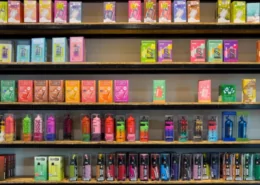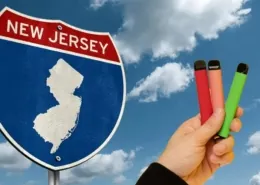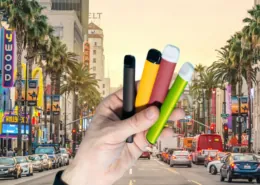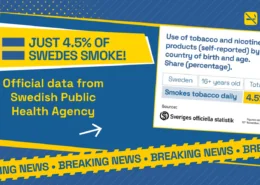California Enacts Stricter Laws on Flavored Vapes and Online Sales
California has passed two new laws, Assembly Bill 3218 (AB 3218) and Senate Bill 1230 (SB 1230), which will further restrict the sale of vaping products and nicotine pouches in the state. The laws, set to take effect on January 1, 2025, ban non-menthol coolants, nicotine analogs like Metatine, and online sales of flavored vapes and pouches. Governor Gavin Newsom signed the bills into law in September after they passed both houses of the State Legislature in August.
Breaking Down the Laws
To grasp the full scope of these new laws, it’s essential to understand their key components and how they build upon existing regulations.
AB 3218: Closing the Online Loophole
California already had a ban on flavored tobacco products, but AB 3218 takes this a step further by prohibiting the online sale of these items. This means that delivery services and online retailers will no longer be able to sell flavored tobacco products to California consumers, effectively closing a loophole that allowed these products to bypass in-store restrictions.
The law also broadens the definition of “characterizing flavors” to include products with cooling sensations, even if they don’t contain traditional flavor additives like menthol. This targets products that use synthetic cooling agents to mimic the sensation of menthol without using the actual ingredient.
Additionally, online sellers will face stricter age verification requirements to ensure that underage individuals cannot purchase these products. The California Department of Public Health (CDPH) will be responsible for enforcing this law.
SB 1230: Establishing the Unflavored Tobacco List
SB 1230 introduces a new framework for identifying and regulating tobacco products through the creation of an Unflavored Tobacco List (UTL). This list will serve as a master catalog of products that have been certified as lacking any characterizing flavors. Only products on this list will be legal for sale in California, while those not included will be considered flavored and prohibited.
The law also expands the definition of nicotine to include both natural and synthetic varieties, as well as nicotine analogs. This ensures that products containing these substances are subject to the same regulations as traditional tobacco-derived nicotine.
Retailers who violate these rules will face increased penalties, with fines starting at $400 for a first offense and escalating to $6,000 for repeat offenses within a five-year period. The California Department of Tax and Fee Administration (CDTFA) will have the power to suspend or revoke the licenses of retailers who repeatedly break the law.
Impact on the Vaping Industry
So, what do these changes mean for vapers and the businesses that serve them? As of January 1, 2025, when the laws take effect, the only e-cigarettes and e-liquids available in California will be those with artificial tobacco flavor. This means that popular flavors like fruit, candy, and dessert will no longer be accessible through legal means.
Simultaneously, the ban on online sales and private imports of nicotine vaping products will make it harder for consumers to obtain their preferred products. Vape producers in the state have already started urging their customers to stock up on flavored products before the ban takes effect.
This isn’t the first time California has taken action against flavored vapes. Some cities, like San Francisco, have already implemented their own restrictions on flavorings. However, studies have shown that these bans may have unintended consequences.
Research conducted by Michael Pesko and teams from Yale and the University of Missouri found that flavor bans often lead to increased smoking rates, particularly among young people. When flavored vapes become harder to obtain, many users seem to shift their nicotine consumption back to traditional cigarettes. In one study, for every 7 milliliters of e-liquid not sold due to flavor bans, 15 cigarettes were sold instead.
This raises important questions about the public health impact of these laws. While they are intended to reduce the appeal of vaping and curb underage use, they may inadvertently push some users toward more harmful tobacco products.
Impact on Nicotine Pouches
Nicotine pouches, which have gained popularity as a smoke-free alternative to traditional tobacco products, are also affected by these new laws. While the state-level ban currently applies to these products, some cities like San Francisco are considering additional restrictions on their online sale.
Major nicotine pouch retailers like Haypp have already halted sales in California to ensure compliance with the evolving regulations. Markus Lindblad, Head of Communications at Pouch Patrol, has acknowledged the role of nicotine pouches in harm reduction but also highlighted the challenges posed by the changing legal landscape.
Navigating the New Landscape
As California’s new laws on flavored vapes and online sales come into effect, both consumers and the vaping industry will need to adapt. For vapers, this may mean exploring alternative products or finding legal ways to access their preferred flavors. Businesses will need to reevaluate their offerings and sales strategies to remain compliant with the new regulations.
The long-term public health implications of these laws remain to be seen. While they aim to reduce the appeal of vaping and limit underage access, they may also have unintended consequences, such as pushing some users back to traditional cigarettes.
As the relationship between vaping, nicotine pouches, and public health continues to evolve, it’s crucial for policymakers, researchers, and industry stakeholders to work together to find solutions that prioritize harm reduction and evidence-based approaches. Only by carefully considering the complex interplay of these factors can we hope to create a regulatory framework that effectively balances public health concerns with the needs and preferences of adult consumers.
- South Korea Bans E-Cigarette Vending Machines Near Schools - July 26, 2025
- Indonesian Vape Producers Urge Government to Lower Excise Taxes - July 26, 2025
- Kyrgyzstan Cigarette Prices Surge 66.7% Since 2021 - July 26, 2025








